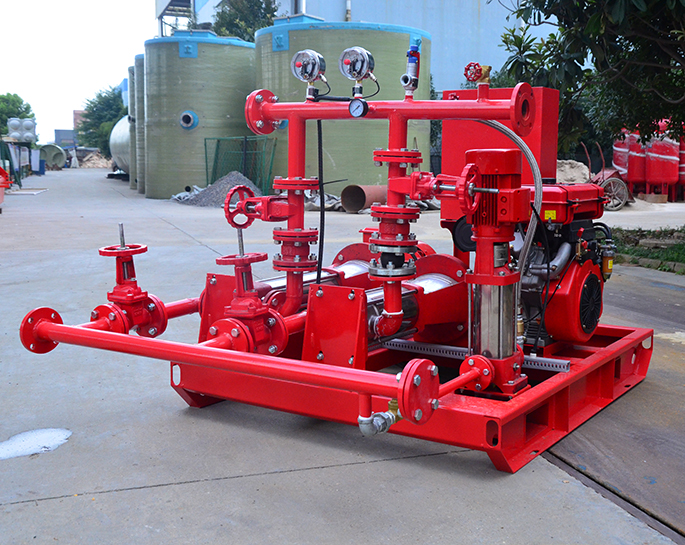What are the environmental considerations associated with firefighting pumps?
Feb 20, 2024
Share:
Firefighting pumps, while essential for combating fires, can have environmental considerations associated with their operation. Here are some key points to consider:
1. **Fuel Emissions**: Many firefighting pumps are powered by internal combustion engines, which emit greenhouse gases and other pollutants during operation. These emissions contribute to air pollution and can have negative effects on air quality and human health.
2. **Fuel Spills**: Handling and transporting fuel for firefighting pumps can pose a risk of spills, which can contaminate soil and water sources. Spilled fuel can also pose a fire hazard, exacerbating the situation during firefighting operations.
3. **Water Usage**: Firefighting pumps require large volumes of water to operate effectively. Drawing water from natural sources such as rivers, lakes, or reservoirs can impact aquatic ecosystems and wildlife habitats, especially during times of drought or low water levels.
4. **Chemical Runoff**: Firefighting agents such as foam or retardants may be used in conjunction with pumps to suppress fires. These chemicals can be toxic to aquatic life and may contaminate soil and waterways if not properly contained and disposed of.
5. **Noise Pollution**: Firefighting pumps can generate significant noise pollution, especially when operated at high speeds for extended periods. This can disturb wildlife and nearby residents, particularly in more rural areas.
6. **Maintenance and Disposal**: Proper maintenance of firefighting pumps is essential to ensure they operate efficiently and minimize environmental impact. Improper disposal of old or malfunctioning pumps can lead to pollution of landfills and groundwater if hazardous materials are not handled appropriately.
7. **Wildfire Effects**: While firefighting pumps are used to combat wildfires, their operation can also have indirect environmental consequences. For example, the suppression of natural fires can alter ecosystems and lead to an increase in fuel loads, potentially exacerbating future fire risks.
Addressing these environmental considerations often involves implementing best management practices, such as using fuel-efficient engines, minimizing fuel spills through proper handling and storage, using environmentally friendly firefighting agents, and adhering to regulations for noise control and waste disposal. Additionally, promoting awareness and education among firefighting personnel can help minimize environmental impacts during firefighting operations.

1. **Fuel Emissions**: Many firefighting pumps are powered by internal combustion engines, which emit greenhouse gases and other pollutants during operation. These emissions contribute to air pollution and can have negative effects on air quality and human health.
2. **Fuel Spills**: Handling and transporting fuel for firefighting pumps can pose a risk of spills, which can contaminate soil and water sources. Spilled fuel can also pose a fire hazard, exacerbating the situation during firefighting operations.
3. **Water Usage**: Firefighting pumps require large volumes of water to operate effectively. Drawing water from natural sources such as rivers, lakes, or reservoirs can impact aquatic ecosystems and wildlife habitats, especially during times of drought or low water levels.
4. **Chemical Runoff**: Firefighting agents such as foam or retardants may be used in conjunction with pumps to suppress fires. These chemicals can be toxic to aquatic life and may contaminate soil and waterways if not properly contained and disposed of.
5. **Noise Pollution**: Firefighting pumps can generate significant noise pollution, especially when operated at high speeds for extended periods. This can disturb wildlife and nearby residents, particularly in more rural areas.
6. **Maintenance and Disposal**: Proper maintenance of firefighting pumps is essential to ensure they operate efficiently and minimize environmental impact. Improper disposal of old or malfunctioning pumps can lead to pollution of landfills and groundwater if hazardous materials are not handled appropriately.
7. **Wildfire Effects**: While firefighting pumps are used to combat wildfires, their operation can also have indirect environmental consequences. For example, the suppression of natural fires can alter ecosystems and lead to an increase in fuel loads, potentially exacerbating future fire risks.
Addressing these environmental considerations often involves implementing best management practices, such as using fuel-efficient engines, minimizing fuel spills through proper handling and storage, using environmentally friendly firefighting agents, and adhering to regulations for noise control and waste disposal. Additionally, promoting awareness and education among firefighting personnel can help minimize environmental impacts during firefighting operations.


.png)
.png)

.png)


